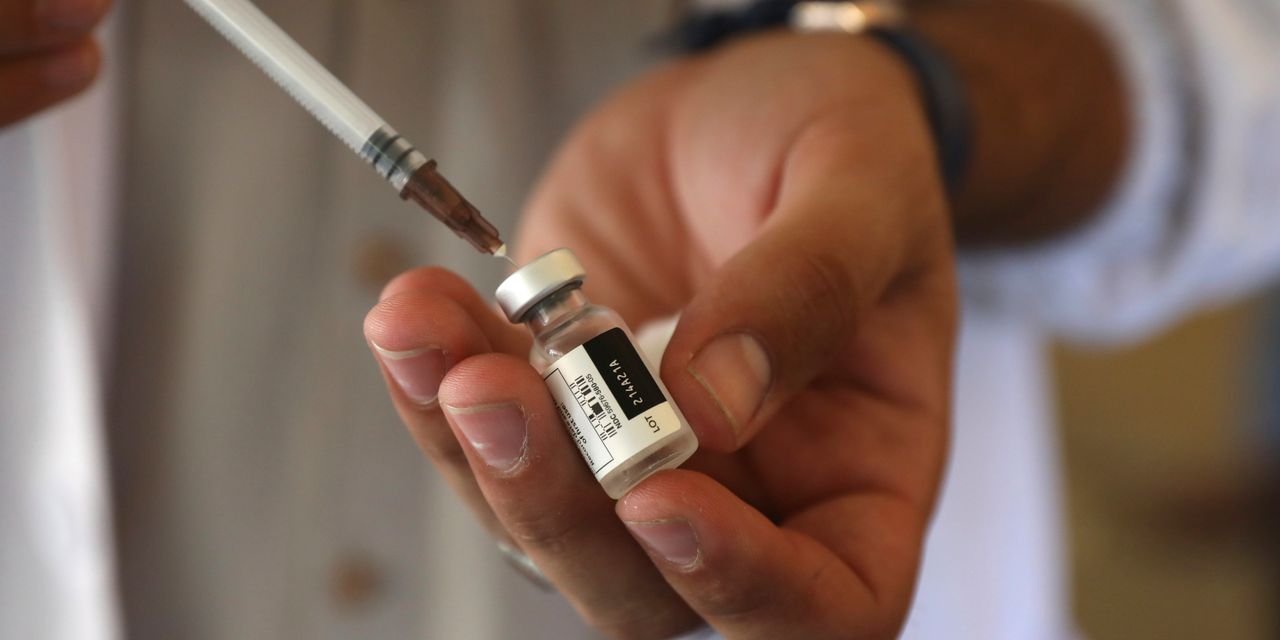U.S. health regulators warned that the
Johnson & Johnson
JNJ -0.16%
Covid-19 vaccine is linked to a very small incidence of cases of a rare neurological disorder associated with other shots.
The Food and Drug Administration added the warning language to the J&J shot’s label on Monday, after finding a handful of cases of Guillain-Barré syndrome among the millions of people who have gotten the vaccine, according to a person familiar with the matter.
Guillain-Barré syndrome is a rare neurological disorder in which the immune system attacks nerves, causing temporary but potentially severe paralysis. The risk is a known one with vaccines, including some influenza vaccines and a leading shot to prevent shingles.
Johnson & Johnson said it had been in discussions with the FDA and other regulators about reports of Guillain-Barré following vaccination with its single dose coronavirus vaccine.
The company said that while the chance of such cases is very low, it exceeds the rate of normally reported cases among the general population by a small degree. The shot is a valuable tool in the fight against the pandemic, the company said.
“Evidence has demonstrated that Johnson & Johnson’s single-shot COVID-19 vaccine offers protection against COVID-19 disease and prevents hospitalization and death, including in countries where viral variants are highly prevalent,” the company said.
The Washington Post earlier reported the FDA’s plans to add the warning.
The warning would be the latest for a vaccine that federal health officials had cautioned raises the risk of a rare blood-clotting condition.
The risk of Guillain-Barré is about three to five cases per million recipients, the person said. The risk in the general population is about 1 in one million.
The Centers for Disease Control and Prevention said that 100 preliminary reports of Guillain-Barré have been detected after 12.8 million J&J doses were administered. It said such cases had largely been reported two weeks after vaccination and mostly in men 50 years and older.
The CDC said available data didn’t show a similar pattern in messenger RNA vaccines, which are the shots from
Pfizer Inc.
and its partner
BioNTech
SE and from
Moderna Inc.
The Johnson & Johnson vaccine uses a harmless type of common-cold virus called an adenovirus. It is engineered to carry a piece of genetic code instructing the body’s cells to make something resembling the spike protein that juts from the surface of the coronavirus.
Production of the spikelike protein, in turn, triggers an immune response that can protect a vaccinated person from Covid-19.
Another Covid-19 vaccine, from
AstraZeneca
PLC, which isn’t authorized in the U.S. but used in the U.K. and other countries, uses a technology similar to Johnson & Johnson’s. AstraZeneca’s shot also is linked to an increased risk of Guillain-Barré, federal health officials said.
AstraZeneca didn’t immediately respond to a request for comment.
The drug-safety advisory committee for Europe’s medicines regulator last week recommended including warning language about a possible link between the AstraZeneca vaccine and Guillain-Barré. The committee said data doesn’t show a link, but also doesn’t rule one out. The committee said it continues to recommend the vaccine as generally safe and effective against Covid-19.
The U.S. authorized the Johnson & Johnson vaccine in late February. Its rollout has struggled after regulators ordered a temporary pause in its administration as investigators studied the rate of the rare clotting disorder among vaccinated people.
The FDA recommends use of the vaccine, saying the benefits outweigh the risks. The agency, however, attached a warning to the vaccine’s label about the risk of the disorder and made recommendations for treatment.
The vaccine requires only one dose and doesn’t need to be stored at ultralow temperatures like messenger RNA vaccines do, which makes it a more straightforward and easier shot for vaccinating people, especially in places for which the freezer conditions and patient follow-up for a second shot would be more difficult to achieve.
—Jenny Strasburg contributed to this article.
Write to Thomas M. Burton at tom.burton@wsj.com and Felicia Schwartz at felicia.schwartz@wsj.com
Copyright ©2020 Dow Jones & Company, Inc. All Rights Reserved. 87990cbe856818d5eddac44c7b1cdeb8














































